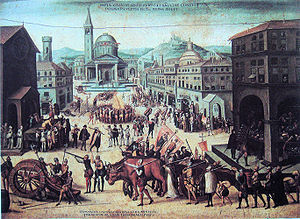When is Theft Not Really Stealing?
 Image via Wikipedia
Image via WikipediaTheo: You do the boss afavour, staying at your desk over your lunch break to field an important callfor him, and, whilst you're captive, in what's generally your own time, yousurf the net. It's company policy that you can do this during your lunch break,provided you don't enter inappropriate sites, of course. You come across anarticle you've been wanting to read; research for a private project. So,without the time to read it there and then, you print off the five pages withthe colour illustrations, on the firm's laser printer so you can take it hometo read in comfort. Is that theft?
Dave: What, taking fivesheets of office paper and a bit of ink they'll never even notice? You'rekiddin', right?
Theo: The question isthis: Is it yours to take?
Dave: Hell, man, you'redoing the boss a favour in your own time. He owes you, doesn't he? Any case, Ibet you waste more paper and ink than that nearly every day by mistake.
Theo: So, you don't thinkit counts as stealing?
Dave: No way.
Theo: The same, I suppose,goes for those odd paper clips, rubber bands and envelopes you take forpersonal use?
Dave: Look, everyone doesthat. You can't call it stealing. The amount they pay for stationery, they'dnever even notice, would they?
Theo: And the privateletters placed into the post tray to be stamped or franked?
Dave: Maybe in an emergency.You know, when it needs to go today and you don't have a stamp or you can't getout the office for some reason. Once in a while won't do any harm, will it?
Theo: What about thatphotocopying of the club's agenda for that meeting you've arranged tonight assecretary? A copy of three pages for each of thirty seven members. How aboutthat?
Dave: It's for a goodcause, isn't it? I mean, I know the boss doesn't give to that cause, but thefirm chooses a charity every year to support, so they don't mind a bit ofgiving, do they?
Theo: Not, then, a matterof principle? More one of expediency, I suppose?
Dave: Horses for courses,mate. What harm's it do. That sort of thing doesn't hurt the company. Any case,everybody does it.
Theo: And because everybodydoes it, that makes it acceptable, or right?
Dave: Well, you can'treally call it stealing, can you? I mean, stealing's important things, thingsthat cost, not little bits and pieces like that.
Theo: So, just to get thisright: everybody does it and they're only small things?
Dave: That's right.
Theo: So. A hundredemployees take a hundred sheets, together with the accompanying ink, what,every week, month, year?
Dave: Now you're beingdaft. Not everyone does that much, do they? I mean that's ten k sheets and alot of ink. No. It's not like that; it's just occasional and not all the staffdo it, do they?
Theo: Not everybody, then?
Dave: Well, no. Some folkaren't interested in that sort of thing. They take other things instead.
Theo: Ah, you mean time?For example, the quarter of an hour they spend talking at the water cooler whenthey're being paid to work? Or the few minutes each day they arrive late? Ormaybe those odd minutes they need for shopping over lunch? That sort of thing?
Dave: That's right. Mostpeople do that sort of thing.
Theo: And that's notstealing, even though they're paid for that time?
Dave: You think the bosseswork every hour of every day? Think they're working when they have a 'meeting' on the golf course? Think they'reworking when they fly business class to some conference they could do by videocall?
Theo: I understand yourpoint. So, what you mean when you say the everybody does it, is that thepractise of petty theft is rife throughout the structure of the workplace andis accepted simply as a part of daily life?
Dave: Well, I wouldn't putit like that. But, yeah, I suppose that's really what it is when you look atit. I mean, no one works every minute of every day doing what they're paid todo, do they?
Theo: I expect not. Infact, I suspect it would be bad for their mental health if they did. But, mypoint here is more about what we call such things. What we label this activity.The bosses see their own small thefts as 'perks', the natural reward for theirlevel of commitment. How do the ordinary workers see their own small acts ofstealing?
Dave: Most of them see itas getting something more out the bosses, if they think of it at all. You'remaking more of it than it really is, Theo. It's just part of working life.
Theo: You're probablyright. But what that means in reality is that workers, and their bosses,actually approve, even if only by not disapproving, the daily general theftwe've discussed.
Dave: Life's too short toworry about things like that.
Theo: But, what concernsme, Dave, is whether the casual acceptance of such petty theft allows somepeople to consider rather more valuable items taken to be also acceptable. Wedon't have time to discuss this now. But I'd like to plant the notion that it'sthe general acceptance of small theft as unimportant that allows some folk togo on to steal the work of others, to see such theft as something normal and ofno harm to anyone.
Dave: It's a thought. But,like you say, we best get back to work. The boss is looking over here andglancing at his watch.

Published on March 03, 2012 09:15
No comments have been added yet.



